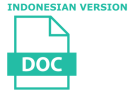Perbandingan Adverbia Penanda Waktu Bahasa Korea dan Bahasa Indonesia
Jayanti Megasari(1*), Ashanti Widyana(2)
(1) Universitas Pendidikan Indonesia
(2) Universitas Pendidikan Indonesia
(*) Corresponding Author
Abstract
This is a comparative study of Korean and Indonesian language. This study aims to describe the form of time markers adverbs in Korean and Indonesian and also to analyze the differences and similarities of the time markers of Korean and Indonesian language. The simple sentences in Korean are translated into Indonesian by following the Indonesian language rules that apply as objects of analysis. It is found that (1) the adverb form of time marker in Korean and Indonesian has very noticeable differences; (2) the time marker in Korean is adverb but it is not applied in Indonesian language. On the other hand, the time marker in Indonesian is adverb but in Korean, it is only suffix particles.
Keywords
Full Text:
PDFReferences
Alwi, H., Lapoliwa, H., Darmowidjojo, S. (2009). Tata Bahasa Baku Bahasa Indonesia. Balai Pustaka.
Fauziah, R. W. (2017). Adverbia “Mousugu”, “Mamonaku”, dan “Sorosoro” yang Memiliki Makna ‘Tak Lama Lagi’ dalam Kalimat Bahasa Jepang. Universitas Diponegoro.
Keraf, G. (1984). Tata Bahasa Indonesia. Nusa Indah.
Kim, C. S. (2006). Current Status and Pro-spect of Korean Literature Education in Korean Education. Bikyomunhwa Yeongu, 18, 25–39. http://www.riss.kr/search/detail/DetailView.do?p_mat_type=1a0202e37d52c72d&control_no=8fcd0caee8021150ffe0bdc3ef48d419&outLink=N
Kobayashi, T. (2017). Analisis Kesalahan Penggunaan Adverbia Penunjuk Waktu “Ima” pada Mahasiswa Pembelajar Bahasa Jepang di Indonesia. Universitas Pendidikan Indonesia.
Kridalaksana, H. (2011). Kamus Linguistik. Ikrar Mandiri Abadi.
Park, D. Y. (2006). A Study on the Aspect of Activity and Accomplishment Verbs in Modern Korea. Hangukhak Yeongu, Vol. 15, 231-251. http://www.koling.org/modules/doc/index.php?doc=intro
Sinurat, H. (2011). Analisis Kontrastif Kata Keterangan Waktu dalam Bahasa Indonesia dan Bahasa Mandarin. Universitas Sumatera Utara.
Son, N. I. (1996). Gukgeeo busa-wa susik daesang: Korean adverbs and formula targets. Hangugeo-hak, Vol. 4, 47-66. https://www.hanmalgeul.org/m/475
Seo, S. J. (2005). Hangugeo-eui busa: Korean Adverb. Seoul National University Press.
Article Metrics
Refbacks
- There are currently no refbacks.
Copyright (c) 2020 The Author(s)

This work is licensed under a Creative Commons Attribution-ShareAlike 4.0 International License.







